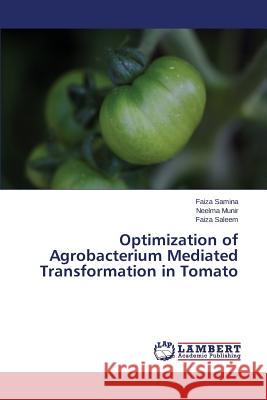Optimization of Agrobacterium Mediated Transformation in Tomato » książka
Optimization of Agrobacterium Mediated Transformation in Tomato
ISBN-13: 9783659540974 / Angielski / Miękka / 2014 / 100 str.
Tomato is one of the most important vegetable crops throughout the world and is available in almost all seasons of the year in tropical and sub-tropical regions. Various conditions for the in vitro germination of tomato were optimized. When seeds were inoculated in half strength MS medium supplemented with 2mg/L BAP and 2mg/L of NAA reduced number of days was recorded for seed germination. A vector having reporter gene GUS was transformed into the four varieties of tomato cultivars. ViaAgrobacterium mediated transformation method. For all four cultivars two types of explants were used hypocotyl and cotyledonary leaves. After co cultivation and 7 days pre selection explants were subjected to the histochemical testing of GUS reporter gene. Theoptimized protocol for the Agrobacterium-mediated transformation of tomato was analyzed and comparered. Cotyledonary leaves and hypocotyl of four varieties of in vitro grown tomato was taken and used for Agrobacterium mediated transformation of vector Pzy102 containing GUS as reporter gene using strain EHA101. Many conditions were optimized for the efficient and optimized transformation of T-DNA into the tomato cultivars. Agrobacterium was grown
Tomato is one of the most important vegetable crops throughout the world and is available in almost all seasons of the year in tropical and sub-tropical regions. Various conditions for the in vitro germination of tomato were optimized. When seeds were inoculated in half strength MS medium supplemented with 2mg/L BAP and 2mg/L of NAA reduced number of days was recorded for seed germination. A vector having reporter gene GUS was transformed into the four varieties of tomato cultivars. ViaAgrobacterium mediated transformation method. For all four cultivars two types of explants were used hypocotyl and cotyledonary leaves. After co cultivation and 7 days pre selection explants were subjected to the histochemical testing of GUS reporter gene. Theoptimized protocol for the Agrobacterium-mediated transformation of tomato was analyzed and comparered. Cotyledonary leaves and hypocotyl of four varieties of in vitro grown tomato was taken and used for Agrobacterium mediated transformation of vector Pzy102 containing GUS as reporter gene using strain EHA101. Many conditions were optimized for the efficient and optimized transformation of T-DNA into the tomato cultivars. Agrobacterium was grown











